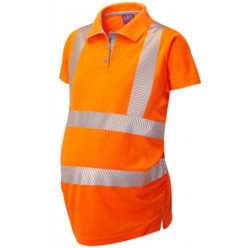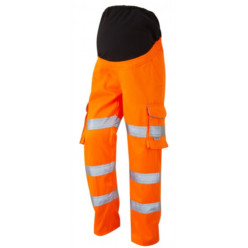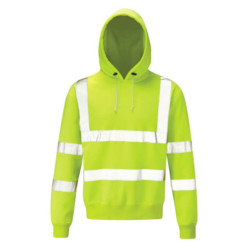-
×
 Lovacott Coolviz Hi Vis Maternity Polo Shirt
Lovacott Coolviz Hi Vis Maternity Polo Shirt
SKU: GLE-PM03 4 × £32.15 -
×
 Leo Verity Hi Vis Maternity Cargo Trouser
Leo Verity Hi Vis Maternity Cargo Trouser
SKU: GLE-CM01 3 × £47.00 -
×
 Vulcan Hi Vis Hooded Sweatshirt
Vulcan Hi Vis Hooded Sweatshirt
SKU: GOB-HVHS 1 × £28.38
Subtotal: £297.98
Around 40 million workwear garments are worn in the UK every year.
Unfortunately 90% of these will end up incinerated or in landfill.
Waste, CO2 emissions, and the use of non renewable resources are the pressing challenges faced by the textile industry today, at a time when sustainability issues are at the forefront of the key considerations and decisions made by organisations worldwide.
There is an urgent need for the ready availability of truly eco-friendly products!
And a vital question is: can workwear be fully recycled?
The good news is… YES!
Workwear CAN be fully recycled subject to certain manufacturing principles, and the choice of raw material!
The slightly less good news is… very little of it actually is.
It is important to realise that, in the main, used workwear does not need to end up in landfill.
There are a number of ways to minimise the environmental impact of discarded industrial clothing, which we investigate in this blog.
But for workwear to be FULLY recycled, to go full circle and end up right back at the beginning of the manufacturing process, there is the requirement to begin with the end in mind.
Let us explain.
First we must address the (comparatively large) elephant in the room.
GREENWASHING!
These days, most people are conversant with the term, but by way of a quick overview, greenwashing can be defined as the deliberate actions of a company or organisation which prioritizes marketing themselves as environmental champions, at the expense of concentrating on actually working to minimize their environmental impact.
In other, blunter words, “intentionally seeking to con the environmentally conscious through misleading or ambiguous advertising.”
Of course, there is a fair amount of inadvertent ignorance combined with much well meaning effort!
So it’s probably a little fairer to say that, in the attempt to attract the ethically minded consumer, a company might confidently claim certain attributes of their product range, believing them to be in good faith.
They may not, however, then be able to back up these claims with solid fact if put to the test.
The BBC summed this up by reporting in 2021:
There are lots of ways that greenwashing can occur, and it is not the intention to delve further into the subject here, but it is rather to highlight that the danger is there, and the answer to it is to gain an understanding of true recycling practises.
Sustainable Practices
A large percentage of the volume of redundant items of clothing will end up going down the re-manufacture route. Whilst this is not a fully recycled solution, it is certainly an environmentally friendlier option, where the garments are repurposed into insulation materials, acoustic panels, or furniture filling for example.
Another slightly less effective (in green terms) alternative is to burn textile waste. This is where Energy Recovery Facilities (ERF’s) play a key role in the supply of sustainable renewable energy, and are instrumental in the effort to reduce carbon emissions.
Both of these options are vastly preferable to indiscriminate waste disposal, and can basically guarantee that any approach to clothing destruction does not need to require the use of landfill sites!
True Recycling Process
The optimum solution is to employ circular sustainable economy methods.
Corporate workwear can only be fully recycled if it is manufactured exclusively from polyester.
Anything made with cotton, or mixed fibres is NOT FULLY RECYCLABLE. Trims, accessories and finishes to the garment also obstruct the recycling process.
Hence the vital requirement to begin the manufacturing process with the end in mind!
A ground-breaking study was undertaken by Project Plan B to determine if fully recyclable clothing was attainable. The result was the development of a set of manufacturing principles they called ‘designed to be recycled’ where 100% polyester garments are processed through their bespoke machinery, generating commercial grade rPET for re-use. This innovative operation is a truly authentic “closed loop” approach.
Tim Cross, MD of Project Plan B explains:
“Our recycling system works through a heat extrusion process, reducing polyester textiles into rPET pellets. These pellets can then be turned into fibre to be spun back into polyester textiles, or used for injection moulding”.
With this breakthrough, the potential for an exponential increase in the volume of workwear being fully recycled is vastly enhanced.
Another company who have pushed the boundaries, and by doing so have furthered the cause of environmental sustainability in clothing products are Envirowear.
As we previously alluded to, the addition of accessories (such as zips and buttons) render garment recycling virtually impossible. Then there is hi vis tape. The reflective element of retro-reflective strip is most commonly glass beads which are also non-recyclable.
This enterprising outfit have formulated a mono-fibre design throughout the whole process that again results in the production of rPET through clothing recycling.
And the Beeswift Envirowear clothing revolution has made circular hi-visibility clothing achievable for the first time, whilst fully adhering to European EN ISO 20471 hi-vis regulations.
An ingenious QR code, embedded in the garment, can be scanned to provide information on where to send it for recycling, and the company promises a carbon footprint reduction of up to 70% as well as a guarantee of zero requirement for incineration or landfill if utilising their hi-vis offerings.
100% Recyclable Industrial Workwear
In conclusion, therefore, the outlook is very positive!
100% recyclable industrial workwear is now available, and thanks to recent seminal research and development, will become even more readily so, in the very near future!
The issue of clothing to landfill, and textile waste, can become a thing of the past, and your sustainability goals will get a major boost.
Your Eco Journey
With the help of proactive account management and insightful reporting, we can take you on an eco journey to transfer your workwear to a fully environmentally-friendly product range – supporting your company’s commitment to sustainability, and ensuring absolute compliance with today’s eco standards.
For further help and support, please contact the Clad Safety Team on 0800 161 3661 or email [email protected]